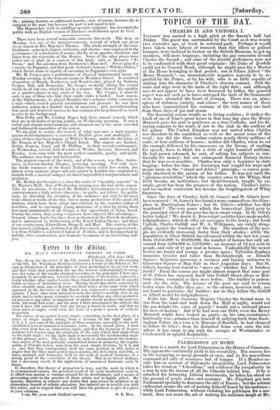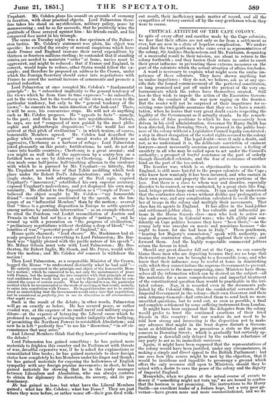PALMERSTON AT HOME.
No man is a match for Lord Palmerston in the House of Commons. His opponents continually yield to his versatility: His success lies in his occupying so many grounds at once, and in his marvellous command not only of resources but of temper. If a Member as- sails him on account of diplomatic irregularity, Lord Palmerston takes his stand on " Liberalism " and confesses the irregularity in a way to win the favour of all "Liberalism,"
Liberals behind him. If he is attacked for betraying Liberal movements he takes his stand on the ground of peace, order, and economy. Mr. Urquhart got into Parliament specially to denounce the ally of Russia; but the solemn enthusiast scorns the art of making himself heard by his audience ; while Lord Palmerston without violating his politeness for a mo- ment, does not scorn the art of making his audience laugh at Mr. Urquhart. Mr. Cobden.plans his assault on grounds of economy in taxation, with clear practical objects. Lord Palmerston there- fore takes his stand on mystification, military policy, peace by manceuvering ; and he so far succeeds, that he positively wins the gratitude of.those arrayed against him : his friends exult, and his conquered foes assist in his triumph.
The scene on Tuesday night was a fine specimen of the Palmer- ston tactics. Mr. Cobden's statement was plain, his object was specific : he recalled the rivalry of mutual suspicious which have made France and England increase their naval expenditure by thirteen or fourteen millions sterling ; he contended that if standing armies, are needed to maintain " order " at home, navies must be aggressiv, and might be reduced ; that if France and England, in concert, would begin to reduce, other States would follow the ex- ample ; and therefore he proposed an address to the Crown, under which the Foreign Secretary should enter into negotiations with France to arrest the mutual increase of armaments and promote a mutual reduction.
Lord Palmerston at once accepted Mr. Cobden's "fundamental principle " : he " subscribed implicitly to the general tendency of the views which he from time to time expresses "—he subscribes, not to the views, but to the tendency of the views, not even to the particular tendency, but only to the "general tendency of the views,"—he concurs in the main direction of the look-out! There, it will be seen, his concurrence stops. He will not do anything such as Mr. Cobden proposes. He "appeals to facts "—namely, to the past; and then he launches into mystification. Nations, he says, are not" composed of men guided by the most philo- sophic and philanthropic dispositions "—" the world has not arrived at that pitch of civilization" : in which truism, of course, honourable Members agreed. Mr. Cobden had described the policy which constructs "great" naval works at Alderney as aggressive, Cherbourg as a harbour of refuge : Lord Palmerston joked pleasantly on this point; fortifications, he said, do not ad- vance into hostile countries ; Cherbourg is a great arsenal ; and you might as well talk of the aggression by a sentry-box on a fortified town as one by Alderney on Cherbourg. Lord Palmer. sten made some half-jocose half-touching allusion to the virulence with which he is pursued by Mr. Urquhart—so bitterly, that Mr. Urquhart accused him of that Tahiti meddling which took place under Sir Robert Peel's Administration; and thus, by a single stroke, he took advantage of the Peel segis, exposed Urquhart's "inaccuracy," established his own superior accuracy, exposed 17rquhart's malevolence mad yet displayed. his own mag- nanimity. He alluded to the Exposition as a "temple of Peace"; believed the object sought by Mr. Cobden—" my honourable friend "—would be more accelerated by the speech, as the lan- guage of an "influential Member," than by the motion ; averred that "there is a growing disposition in Europe to settle quarrels among nations by amicable intervention" : as an example whereof, he cited the Peachuni snd Lookit reconciliation of Austria and Prussia in what had not been a dispute of " nations "; and he wound up with a peroration on "the progress of civilization," "preliminary negotiations without shedding a drop of blood," " ca- lamities of war," "powerful people of England," &c. House quite charmed ; "loud cheers." Mr. Mackinnon had al- ready proposed to leave everything to Lord Palmerston; Mr. Roe- buck was "highly pleased with the pacific nature of his speech " ; Mr. Milner Gibson must vote with Lord Palmerston ; Mr. Bro- therton, Sir Robert Inglis, Mr. Geach, and Mr. Pryce, would with- draw the motion ; and Mr. Cobden did consent to withdraw the motion !
Then Lord Palmerston, as a responsible Minister of the Crown, begged the House "to understand distinctly what he had said "-
He entirely concurred in the principle and object of the honourable Mem- ber's motion ; which he conceived to be, not only the maintenance of peace with France, but the inspiring the two countries with that principle of mu- tual confidence that would best put an end to those jealousies that he con- sidered the cause of certain results. What he objected to was, the particular method which he recommended as the mode of arriving at that result, namely, to enter into negotiation with France. He begged therefore not to be under- stood as undertaking that the Government would enter into that negotiation, but be considered as perfectly free to use its discretion in all circumstances that might arise.
Such is the result of the debate ; in other words, Palmerston will go on exactly as before. He has secured peace, or rather evaded war, at the expense of no small naval and military expen-
diture at the expense of betraying the Liberal cause which he professed to support, of acquiescing under indignity after bullying, of permitting the Northern Powers to reestablish Absolutism; and now he is left "perfectly free" to use his "discretion," "in all cir- cumstances that may arise."
And Liberal Members think that they have gained something by the debate !
Lord Palmerston has gained something: be has gained more materials to frighten this country and its Parliament with threats of war, dreadful ex-pensive war, if he is asked for explanations or unmutilated blue books ; he has gained materials to show foreign states how completely he has Members under his finger and thumb ; he has gained materials for exposing the hollowness of English sympathy with any foreign popular movements; in short, he has slimed materials for showing that he is the ready manager gained Liberalism" and Absolutism, who can always contrive to obtain for diplomacy its discretion, its secrecy, and its pre- dominancy. " He has gained no less ; but what have the Liberal Members gamed; what has Mr, Cobden; what has Peace P They are just where they were before, or rather worse off—their gun fired with-
out result, their inefficiency made matter of record, and all the sympathies of victory carried off by the easy gentleman whom they were to coerce.



























 Previous page
Previous page